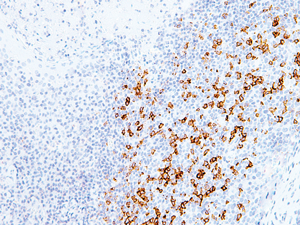anti-PD-1 (human), mAb (AG-IHC001)
Product Code:
AG-20B-6020
AG-20B-6020
Antibody Clonality:
Monoclonal
Monoclonal
Regulatory Status:
RUO
RUO
Target Species:
Human
Human
Shipping:
Blue Ice (not freeze)
Blue Ice (not freeze)
Storage:
+4°C
+4°C
No additional charges, what you see is what you pay! *
| Code | Size | Price |
|---|
| AG-20B-6020-R100 | 100 ul | £130.00 |
Quantity:
Prices exclude any Taxes / VAT
Stay in control of your spending. These prices have no additional charges, not even shipping!
* Rare exceptions are clearly labelled (only 0.14% of items!).
* Rare exceptions are clearly labelled (only 0.14% of items!).
Multibuy discounts available! Contact us to find what you can save.
This product comes from: Switzerland.
Typical lead time: 7-10 working days.
Contact us for more accurate information.
Typical lead time: 7-10 working days.
Contact us for more accurate information.
- Further Information
- Documents
- Related Products
- Show All
Further Information
Alternate Names/Synonyms:
CD279; Programmed Cell Death Protein 1
EClass:
32160000
Form (Short):
liquid
Formulation:
Liquid. In Tris Buffer, pH 7.4, containing 1% BSA and <0.1% sodium azide.
Handling Advice:
Do not freeze.
Immunogen:
Recombinant human PD-1 fused to a His-tag.
Long Description:
Monoclonal Antibody. Recognizes human PD-1 (CD279). Applications: ELISA, IHC. Isotype: Mouse IgG2b. Clone: AG-IHC001. Liquid. In Tris Buffer, pH 7.4, containing 1% BSA and <0.1% sodium azide. Programmed Death 1 (PD-1) is a member of the CD28/CTLA-4 family of T cell regulators, expressed as a co-receptor on the surface of activated T cells, B cells and macrophages. Several studies have suggested that the PD-1/PD-L1 signaling pathway may be linked to antitumor immunity, as PD-L1 has been shown to induce apoptosis of activated T cells or inhibit activity of cytotoxic T cells. In comparison to CD10 and Bcl-6, PD-1 is expressed by fewer B cells and has therefore been considered a more specific and useful diagnostic marker for angioimmunoblastic T cell lymphoma. Therapies targeted toward the PD-1 receptor have shown remarkable clinical responses in patients with various types of cancer, including non-small-cell lung cancer, melanoma and renal-cell cancer.
This antibody is intended to qualitatively identify by light microscopy the presence of associated antigens in sections of formalin-fixed, paraffin-embedded tissue sections using IHC test methods. It has been optimized and validated using the BOND-MAX fully automated IHC&ISH stainer (see Protocol).
NCBI, Uniprot Number:
Q15116
Package Type:
Plastic Vial
Product Description:
Programmed Death 1 (PD-1) is a member of the CD28/CTLA-4 family of T cell regulators, expressed as a co-receptor on the surface of activated T cells, B cells and macrophages. Several studies have suggested that the PD-1/PD-L1 signaling pathway may be linked to antitumor immunity, as PD-L1 has been shown to induce apoptosis of activated T cells or inhibit activity of cytotoxic T cells. In comparison to CD10 and Bcl-6, PD-1 is expressed by fewer B cells and has therefore been considered a more specific and useful diagnostic marker for angioimmunoblastic T cell lymphoma. Therapies targeted toward the PD-1 receptor have shown remarkable clinical responses in patients with various types of cancer, including non-small-cell lung cancer, melanoma and renal-cell cancer. This antibody is intended to qualitatively identify by light microscopy the presence of associated antigens in sections of formalin-fixed, paraffin-embedded tissue sections using IHC test methods. It has been optimized and validated using the BOND-MAX fully automated IHC&ISH stainer (see Protocol).
Purity:
Protein A/G purified.
Source / Host:
Purified from concentrated hybridoma tissue culture supernatant.
Specificity:
Recognizes human PD-1 (CD279).
Transportation:
Non-hazardous
UNSPSC Category:
Primary Antibodies
UNSPSC Number:
12352203
Use & Stability:
Stable for at least 1 year after receipt when stored at +4°C.
Related Products
| Product Name | Product Code | Supplier | anti-CD279 [PD-1] (human), mAb (ANC4H6) | ANC-279-020 | Ancell | Summary Details | |||||||||||||||||||||||||||||||||||||||||||||||||||||||||||||||||||||||||||||||||||||||||||||
|---|---|---|---|---|---|---|---|---|---|---|---|---|---|---|---|---|---|---|---|---|---|---|---|---|---|---|---|---|---|---|---|---|---|---|---|---|---|---|---|---|---|---|---|---|---|---|---|---|---|---|---|---|---|---|---|---|---|---|---|---|---|---|---|---|---|---|---|---|---|---|---|---|---|---|---|---|---|---|---|---|---|---|---|---|---|---|---|---|---|---|---|---|---|---|---|---|---|---|---|
| anti-CD279 [PD-1] (human), mAb (ANC4H6) (Biotin) | ANC-279-030 | Ancell | Summary Details | ||||||||||||||||||||||||||||||||||||||||||||||||||||||||||||||||||||||||||||||||||||||||||||||||
| anti-CD279 [PD-1] (human), mAb (ANC4H6) (FITC) | ANC-279-040 | Ancell | Summary Details | ||||||||||||||||||||||||||||||||||||||||||||||||||||||||||||||||||||||||||||||||||||||||||||||||
| anti-CD279 [PD-1] (human), mAb (ANC4H6) (preservative free) | ANC-279-820 | Ancell | Summary Details | ||||||||||||||||||||||||||||||||||||||||||||||||||||||||||||||||||||||||||||||||||||||||||||||||
| CD279 [PD-1] (human)-muIg Fusion Protein | ANC-549-020 | Ancell | Summary Details | ||||||||||||||||||||||||||||||||||||||||||||||||||||||||||||||||||||||||||||||||||||||||||||||||
| CD279 [PD-1] (human)-muIg Fusion Protein (Biotin) | ANC-549-030 | Ancell | Summary Details | ||||||||||||||||||||||||||||||||||||||||||||||||||||||||||||||||||||||||||||||||||||||||||||||||
| CD279 [PD-1] (human)-muIg Fusion Protein (preservative free) | ANC-549-820 | Ancell | Summary Details | ||||||||||||||||||||||||||||||||||||||||||||||||||||||||||||||||||||||||||||||||||||||||||||||||



